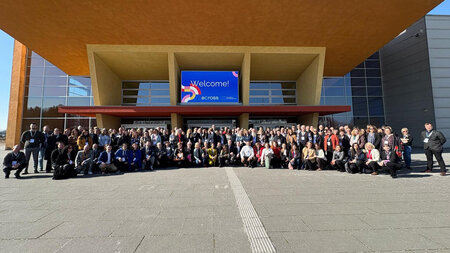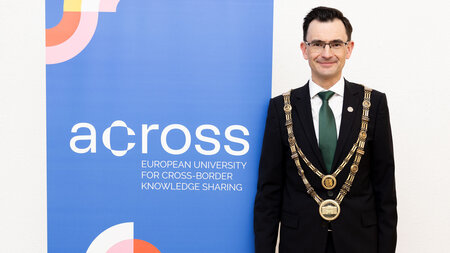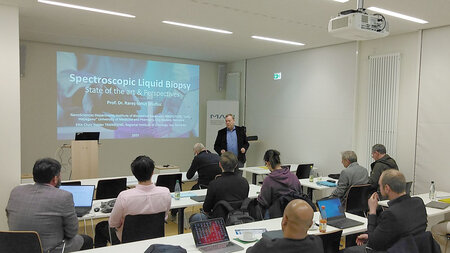Sustainability is the Main Focus
The former European Commissioner Janez Potocnik and Thomas Schmidt, Saxon State Minister for Environment and Agriculture, visited the TU Chemnitz and the Fraunhofer IWU on 31st October 2015
-

During the tour, the former European Commissioner for the Environment, Janez Potocnik, Ph.D. (centre), Prof. Dr. Andreas Schubert, Vice-Rector for Knowledge and Technology Transfer of TU Chemnitz, (l.) and Prof. Dr. Thomas Lampke from the Institute of Materials Science and Engineering (r.) also talked to students from India, who are enrolled in the international Master’s Programme Merge Technologies for Resource Efficiency. Photo: Wolfgang Schmidt
On October 31st, 2015, the former European Commissioner for the Environment, Janez Potocnik, Ph.D., was awarded the Hans-Carl-von-Carlowitz Gesellschaft Sustainability Award in the “Europe” category, as part of the 3rd Saxon Sustainability Conference in Chemnitz. Shortly thereafter, the Slovenian politician visited the Technische Universität Chemnitz. He was accompanied, among others, by Thomas Schmidt, Saxon State Minister for Environment and Agriculture. On the campus of the TU, guests caught up on the work of the Federal Cluster of Excellence “Merge Technologies for Multifunctional Lightweight Structures” (MERGE).
Prof. Dr. Andreas Schubert, Vice-Rector for Knowledge and Technology Transfer of the TU Chemnitz, who welcomed the guests, showed how the nationally and internationally strongly-networked university is approaching key issues of the future, which have also been adopted at the European level in the Horizon 2020 programme and in the Federal Government’s high-tech strategy. The topics range from the development of sustainable products to Industry 4.0. “We made it clear how important the issue of sustainability is at the TU Chemnitz and at the neighbouring Fraunhofer institutes, which competencies we have and in which networks of science, economics and politics we already operate successfully,” said Prof. Schubert.
In this context, the guests visited the new research halls of the Federal Cluster of Excellence, which went into service at the beginning of October. The costs of the first construction phase amount to approximately 12.5 million Euros, which are almost entirely financed by the European Regional Development Fund (ERDF). “The goal of MERGE is to consolidate currently separate manufacturing processes involved in processing different material groups such as textiles, plastics and metals. Multi-component parts can thus be mass produced more cost- and energy-efficiently,” explained Prof. Dr. Thomas Lampke, Vice Dean for Research in the Department of Mechanical Engineering. During the tour of the research halls, Dr. Jürgen Tröltzsch, Managing Director of the Cluster of Excellence MERGE, illustrated this to the guests by means of a few practical examples.
At the end of their brief campus visit, the delegation also visited the “E³-Research Factory Resource-efficient Production” of the Fraunhofer Institute for Machine Tools and Forming Technology IWU.
(Translation: Grätel Marksteiner & Sarah Wilson)
Mario Steinebach
11.11.2015





